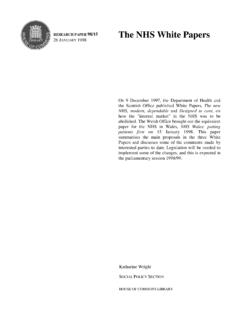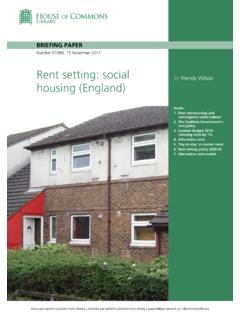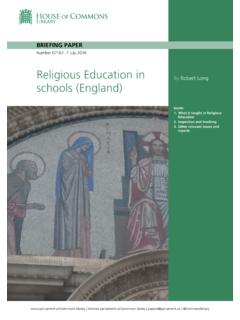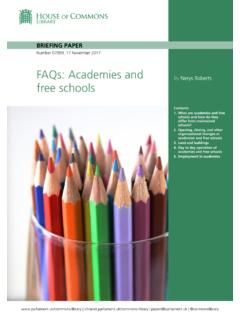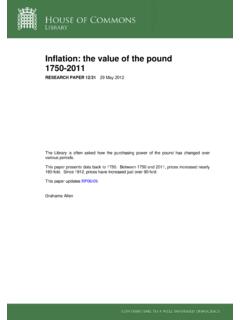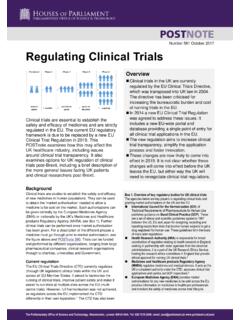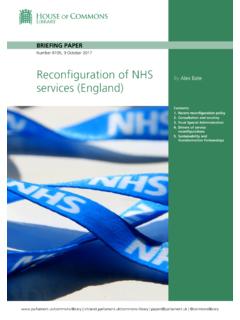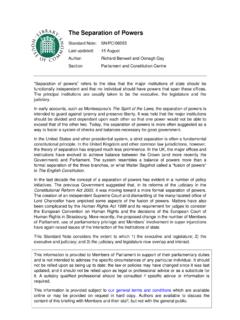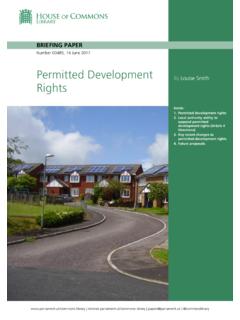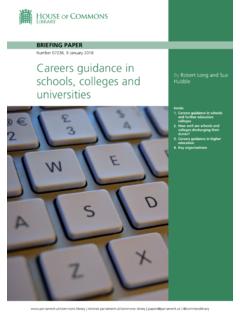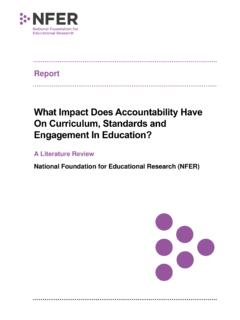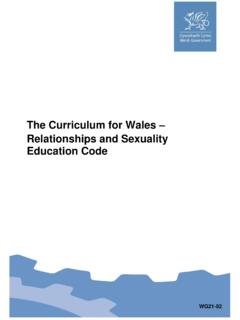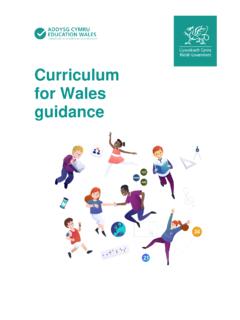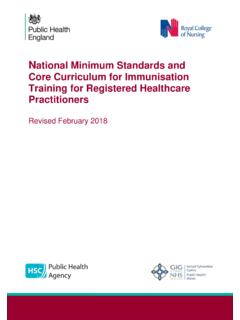Transcription of Religious Education in Schools (England)
1 | | | @commonslibrary BRIEFING PAPER Number 07167, 7 July 2016 Religious Education in Schools (England) By Robert Long Inside: 1. What is taught in Religious Education 2. Inspection and teaching 3. Other relevant issues and reports Number 07167, 7 July 2016 2 Contents Summary 3 1. What is taught in Religious Education 4 Introduction 4 Uptake of RE at GCSE level 4 RE in local authority maintained Schools 4 RE in academies and free Schools 6 RE in faith Schools 6 GCSE and A level RE 7 Consultation on revised content 7 Government response and new content 8 Court challenge on the exclusion of humanism from the GCSE syllabus and DfE response 9 Further Government guidance on the GCSE syllabus and the Religious Studies curriculum 11 House of Lords debate 11 Religious Education Council of England and wales
2 Review and non-statutory programme of study (October 2013) 12 2. Inspection and teaching 13 Reserved teachers 13 How well is RE taught? 14 Ofsted report (October 2013) 14 Ofsted report (June 2010) 15 Training and support for RE teachers 16 Bursaries for RE teachers 17 Statistical information on RE teachers qualifications 17 Government comment on teacher training 18 Organisations providing resources for RE teachers 18 3. Other relevant issues and reports 19 Right to withdraw a child from Religious Education 19 Collective worship 20 RE in performance tables and the English Baccalaureate 21 A strengthened EBacc: September 2015 23 Teaching of creationism 23 A new settlement?
3 Clarke and Woodhead report on religion in Schools 24 RE for REal report, Goldsmiths College 24 Commission on Religion and Belief in British Public Life report 25 Contributing Authors: Sue Hubble, Social Policy Section, teachers bursaries Paul Bolton, Social and General Statistics, statistical information Cover page image copyright: Robert Long 3 Religious Education in Schools (England) Summary Religious Education (RE) must be taught by all state-funded Schools in England. However, it has an unusual position on the curriculum : it is part of the basic curriculum but not the National curriculum , and is one of two subjects (along with sex and relationship Education ) where parents have a legal right to withdraw their children from class.
4 This briefing introduces the rules around RE in state-funded Schools , whether they are academies or free Schools , or maintained by a local authority. It introduces concerns that have been raised about the quality of RE teaching, including the number of RE teachers with qualifications relevant to the subject. It also provides information on other related issues, such as the parental right of withdrawal from RE and the rules on collective worship in Schools . As Schools policy is a devolved topic, this briefing provides information on the position in England.
5 Information on the teaching of RE in Scotland, wales , and Northern Ireland is available on the websites of the respective countries Governments. Number 07167, 7 July 2016 4 1. What is taught in Religious Education Introduction All state-funded Schools must teach Religious Education (RE). Maintained Schools without a Religious character must follow the syllabus agreed by the local agreed syllabus conference (ASC), an occasional body which local authorities are required to establish and The Department for Education s Governors Handbook provides information on the teaching of RE in other Schools : Voluntary aided Schools with a Religious character should provide RE in accordance with the trust deed or Religious designation of the school , unless parents request the locally agreed syllabus.
6 Foundation Schools and voluntary controlled Schools with a Religious character should follow the locally agreed syllabus, unless parents request RE in accordance with the trust deed or Religious designation of the school . RE is also compulsory in faith and non-faith academies and free Schools as set out in their funding Uptake of RE at GCSE level3 The total number of pupils entering RE GCSE has increased substantially in recent years from 164,000 in 2008 to almost 260,000 in 2014; a rise from 25% to 42% of pupils. [Source: Revised GCSE and equivalent results in England: 2013 to 2014, DfE] RE in local authority maintained Schools Religious Education is a component of the basic curriculum (but not the National curriculum ) and is compulsory for all pupils in local authority maintained Schools aged 5 to 18 years unless they are withdrawn from these lessons by their parents, or withdraw by their own choice after their 18th birthday.
7 (The provision applies to school sixth forms, therefore, whereas no equivalent is in place for 16-18 year olds in sixth form colleges or other further Education institutions.) They are not obliged to give a reason, and the school is expected to comply with the request. The statutory provisions relating to Religious Education are contained in sections 69 and 71 and schedule 19 of the school Standards and Framework Act 1998, as amended. Non-statutory guidance for maintained Schools provides further background on the position of the RE curriculum for maintained Schools : 1 Department for Children, Schools and Families, Religious Education in English Schools .
8 Non statutory guidance 2010, p10 and p14 2 Department for Education , Governors Handbook, September 2014, p51 3 Section by Paul Bolton, Social and General Statistics 5 Religious Education in Schools (England) The key document in determining the teaching of RE is the locally agreed syllabus within the LA concerned (see 'Agreed syllabus', ). Schools designated as having a Religious character are free to make their own decisions in preparing their syllabuses. LAs must, however, ensure that the agreed syllabus for their area is consistent with Section 375(3) of the Education Act 1996, which requires the syllabus to reflect that the Religious traditions of Great Britain are in the main Christian whilst taking account of the teaching and practices of the other principal religions represented in Great The guidance sets out the following on the agreed syllabus.
9 The locally agreed syllabus is a statutory syllabus of RE prepared under Schedule 31 to the Education Act 1996 and adopted by the LA under that schedule. It must be followed in maintained Schools without a designated denomination. Once adopted by the LA, the agreed syllabus sets out what pupils should be taught and can include the expected standards of pupils performance at different stages. Every locally agreed syllabus must reflect that the Religious traditions of Great Britain are in the main Christian, while taking account of the teaching and practices of the other principal religions represented in Great Britain.
10 The law does not define what the principal religions represented in Great Britain are. ASCs [agreed syllabus conferences] can decide which are the principal religions represented in Great Britain, other than Christianity, to be included in their agreed syllabus. Agreed syllabuses in any community school and any foundation, voluntary-aided or voluntary-controlled school without a Religious character cannot require RE to be provided by means of any catechism or formulary which is distinctive of a particular Religious denomination. This prohibition does not extend to the study of catechisms and Owing to its position as part of the basic curriculum but not the National curriculum , Religious Education was not included in the Government s National curriculum review.
